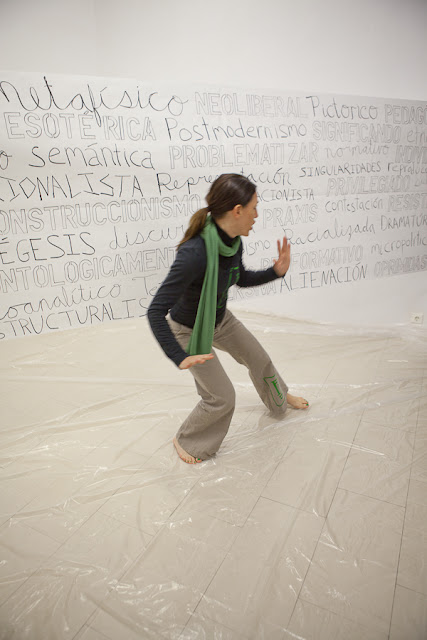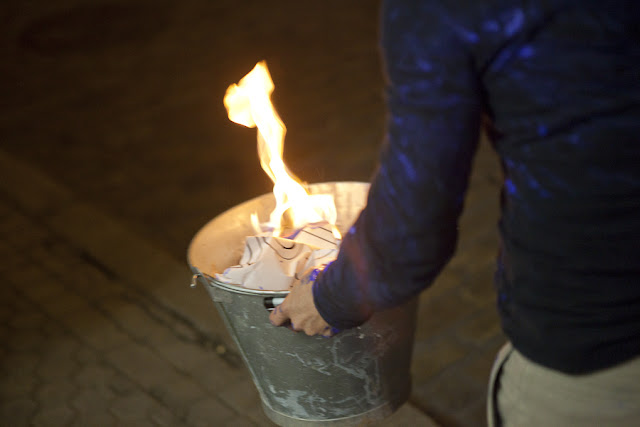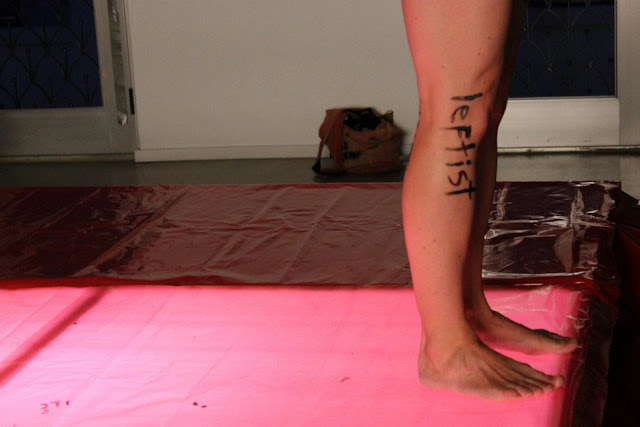The Jewish New Year, Rosh Hashanah, always falls sometime in September. Eight days later comes Yom Kippur, the Day of Atonement.
Rosh Hashanah for me always meant apples and honey, and an afternoon party with Jewish family members. Yom Kippur was always the day I tried to fast with my mother, but I usually only made it through the morning.
When I was about ten years old I had a profound break with Judaism, based on my very literal understanding of our rabbi's explanation of Yom Kippur. I heard him say that as long as a person told God they were sorry for whatever bad thing they had done, God would forgive him and re-inscribe him in the Book of Life for another year. "But that's not right!" I shrieked to my mother. "If you kill someone God should not forgive you!" I refused to go back to synagogue.
Years later I understand that the rabbi meant Jews should use the time between Rosh Hashanah and Yom Kippur to try to resolve problems with other people, and with God.
I created my action as an adaptation of taschlich, a traditional ritual from this time of year in which people throw bread into a body of water, and the water carries away the bread as though it were carrying away our sins.
El ano nuevo judío, Rosh Hashanah, siempre cae en algún día de septiembre. Ocho días después viene Yom Kippur, Dia de la Expiación.
Rosh Hashanah para mi siempre significaba manzanas con miel, y una fiesta por la tarde con familiares judíos. Yom Kippur siempre era el día en que intentaba ayunar con mi madre, pero normalmente solo aguantaba hasta el mediodía.
Cuando tenia 10 anos me rompí profundamente con judaísmo, en base de mi comprensión muy literal de la explicación del rabbi sobre Yom Kippur. Yo lo entendi decir que tan pronto como una persona pedía disculpas de Dios por cualquier transgresión, que Dios lo perdonaría y lo reinscribiria en el Libro de la Vida para otro ano.
"Pero eso no es correcto" grite a mi mama. "Si mates a alguien Dios no te debía perdonar!" Rehusia regresar a la sinagoga.
Anos después entiendo que el rabbi quería decir que los judíos deben usar el tiempo entre Rosh Hashanah y Yom Kippur para resolver problemas con otras personas, y con Dios.
Mi acción es una adaptación de taschlich, un rito tradicional en que la gente tira pan al agua, y el agua lleva el pan como si fuera los pecados del ano viejo.
For my action I put on a white dress
and bright blue rubber gloves, the kind used to wash dishes.
Para mi acción me puse un vestido blanco
y guantes de goma azul celeste, el tipo que se usa para lavar platos
I wrestled a large blender out of a suitcase.
Luché para sacar una licuadora grande de una maleta.
I wrote onto slips of paper things I would like to leave behind in the old year:
Insecurity
Anxiety
Depression
Misunderstandings
Escribi en papelitos cosas que quisiera dejar detrás en el ano viejo:
Inseguridad
Ansiedad
Depresión
Malentendidos
I tore them up and put them in a blender.
I added some water from a bright blue watering pail.
Deshice los papelitos y los metí en la licaudora
Eche agua de una regadera de color azul celeste.
I turned on the blender.
Encendí la licuadora.
I wrote onto slips of paper things I would like to cultivate in the new year.
Creativity
Balance
Self-Confidence
Good communication
Escribí en papelitos cosas que quiero cultivar en al ano nuevo:
Creatividad
Equilibrio
Auto-confianza
Buenas comunicaciones
I poured the contents of the blender into a metal bucket.
I poured some earth into the bucket.
I crumpled up and 'planted' each piece of paper in the earth.
I watered my 'seeds' from the blight blue watering can.
I planted some plastic flowers in the earth.
I walked away.
Eché el contenido de la licuadora en un cubo de metal.
Eché tierra encima.
Arrugé a los papelitos y los 'sembré' en la tierra.
Regué mis 'semillas' de la regadera azul celeste.
Puse algunas flores plásticos en la tierra.
Me fui.
Rosh Hashanah for me always meant apples and honey, and an afternoon party with Jewish family members. Yom Kippur was always the day I tried to fast with my mother, but I usually only made it through the morning.
When I was about ten years old I had a profound break with Judaism, based on my very literal understanding of our rabbi's explanation of Yom Kippur. I heard him say that as long as a person told God they were sorry for whatever bad thing they had done, God would forgive him and re-inscribe him in the Book of Life for another year. "But that's not right!" I shrieked to my mother. "If you kill someone God should not forgive you!" I refused to go back to synagogue.
Years later I understand that the rabbi meant Jews should use the time between Rosh Hashanah and Yom Kippur to try to resolve problems with other people, and with God.
I created my action as an adaptation of taschlich, a traditional ritual from this time of year in which people throw bread into a body of water, and the water carries away the bread as though it were carrying away our sins.
El ano nuevo judío, Rosh Hashanah, siempre cae en algún día de septiembre. Ocho días después viene Yom Kippur, Dia de la Expiación.
Rosh Hashanah para mi siempre significaba manzanas con miel, y una fiesta por la tarde con familiares judíos. Yom Kippur siempre era el día en que intentaba ayunar con mi madre, pero normalmente solo aguantaba hasta el mediodía.
Cuando tenia 10 anos me rompí profundamente con judaísmo, en base de mi comprensión muy literal de la explicación del rabbi sobre Yom Kippur. Yo lo entendi decir que tan pronto como una persona pedía disculpas de Dios por cualquier transgresión, que Dios lo perdonaría y lo reinscribiria en el Libro de la Vida para otro ano.
"Pero eso no es correcto" grite a mi mama. "Si mates a alguien Dios no te debía perdonar!" Rehusia regresar a la sinagoga.
Anos después entiendo que el rabbi quería decir que los judíos deben usar el tiempo entre Rosh Hashanah y Yom Kippur para resolver problemas con otras personas, y con Dios.
Mi acción es una adaptación de taschlich, un rito tradicional en que la gente tira pan al agua, y el agua lleva el pan como si fuera los pecados del ano viejo.
For my action I put on a white dress
and bright blue rubber gloves, the kind used to wash dishes.
Para mi acción me puse un vestido blanco
y guantes de goma azul celeste, el tipo que se usa para lavar platos
I wrestled a large blender out of a suitcase.
Luché para sacar una licuadora grande de una maleta.
I wrote onto slips of paper things I would like to leave behind in the old year:
Insecurity
Anxiety
Depression
Misunderstandings
Escribi en papelitos cosas que quisiera dejar detrás en el ano viejo:
Inseguridad
Ansiedad
Depresión
Malentendidos
 |
| Antic Teatre, Barcelona, Corpologia - Denys Blacker |
I tore them up and put them in a blender.
I added some water from a bright blue watering pail.
Deshice los papelitos y los metí en la licaudora
Eche agua de una regadera de color azul celeste.
 |
| photo by Denys Blacker |
I turned on the blender.
Encendí la licuadora.
 |
| photo by Denys Blacker |
I wrote onto slips of paper things I would like to cultivate in the new year.
Creativity
Balance
Self-Confidence
Good communication
Escribí en papelitos cosas que quiero cultivar en al ano nuevo:
Creatividad
Equilibrio
Auto-confianza
Buenas comunicaciones
I poured the contents of the blender into a metal bucket.
I poured some earth into the bucket.
I crumpled up and 'planted' each piece of paper in the earth.
I watered my 'seeds' from the blight blue watering can.
I planted some plastic flowers in the earth.
I walked away.
Eché el contenido de la licuadora en un cubo de metal.
Eché tierra encima.
Arrugé a los papelitos y los 'sembré' en la tierra.
Regué mis 'semillas' de la regadera azul celeste.
Puse algunas flores plásticos en la tierra.
Me fui.
 |
| photo by Denys Blacker |
































